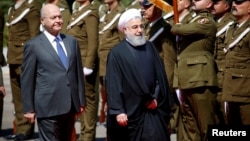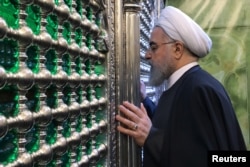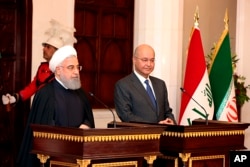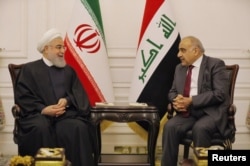Iranian President Hassan Rouhani began a three-day state visit to Iraq Monday by meeting host President Barham Salih, amid hopes of increasing the volume of trade between the two countries, despite U.S. economic sanctions that were imposed on Tehran in August and November of last year.
It's not clear how far Iraq will go to strengthen economic ties with Tehran, but Iraq has been Iran's most important trading partner in recent years.
An Iraqi military band played bagpipes as an honor guard welcomed Rouhani to the Qasr as Salam palace in Baghdad's Green Zone to confer with Salih and other top leaders. Arab media reported that Salih did not travel to the airport to meet Rouhani, in what some were interpreting as a minor snub.
Rouhani made a special visit to the revered Shiite mausoleum of Imam Moussa Kazim. The Iranian president is hoping to meet Iraq's top Shiite dignitary, Ayatollah Ali Sistani, although Arab media reported that it was not clear if the ayatollah would see him. Sistani has not met with foreign political leaders since 2015.
During a televised news conference, Rouhani and Salih talked about strengthening political and economic ties between the two countries, which fought a brutal and bloody eight-year war, from 1980-1988, in which more than a million people died.
Salih told reporters that Iraq has been the "battleground for conflicts between regional and international powers," adding it is imperative that "regional states cooperate to combat terrorism for mutual economic benefit."
Salih said that he hopes that Iraq's neighbors understand that stability in his country is important for everyone's interest. He adds that many claim that Iraq is in a bad geographic location, but he says that his country has the good fortune to have Iran, Turkey and the Arab states for neighbors.
Despite U.S. economic sanctions placed on Tehran by the Trump administration last year, and efforts by Washington to urge regional states like Iraq to observe them, Rouhani appeared to be eager to increase trade with Baghdad.
Rouhani said that there are many possible fields of cooperation between Iran and Iraq, including trade, investment, joint industrial and trade zones along with tourism. He stresses the need to strengthen cooperation over energy, including oil, gas and electricity, along with industrial cooperation, and cooperation in road, rail and water links.
Brian Hook, the U.S. Special Representative for Iran and senior policy adviser to Secretary of State Mike Pompeo, told Alhurra that "you have to question the motive" of Rouhani coming to Iraq.
"I think what Iran would ultimately like to see happen is Iraq turn into a province of Iran so that they can create a military highway across the northern Middle East that the Iran Revolutionary Guard Corps can use to ferry missiles and weapons," he said, adding, "President Rouhani coming to Iraq is not in the interest of the Iraqi people."
He also warned that the U.S. waiver granted to Iraq from sanctions against Iran is dependant on Iraq reducing dependence on Iranian electricity. He said there has been some progress on that front, but said, "We need to continue to see progress."
Hilal Khashan, who teaches political science at the American University of Beirut, told VOA that he doesn't think that the U.S. will be able to stop trade between Iraq and Iran, despite clamping down on the banking sector.
"They keep trading. There is no doubt about it and I don't think the U.S. can stop this trade; however, the volume of trade between Iraq and Turkey is significantly larger than the volume of trade between Iraq and Iran,” Khashan said. “Iranian products are not of good quality and they do not compare to Turkish goods."
Khashan said he thinks that some members of the Iraqi government "have resisted increasing trade with Iran" because of the low quality of Iranian goods, and because of "ill-feelings over Iran's unwillingness to provide electricity to border regions when it was most needed."
Iraqi analyst Hani Ashour, however, told Al Arabiya TV that he thinks Iran may well succeed in "increasing trade from previous yearly highs of $12 billion to $20 billion," despite U.S. economic sanctions.
Ashour said he argues that the U.S. "may have a tacit agreement with Iran to avoid conflict over trade with Iraq in return for Tehran agreeing not to place pressure on its political allies in Baghdad to ask the U.S. to withdraw its troops from the country."
Alhurra contributed to this report.







